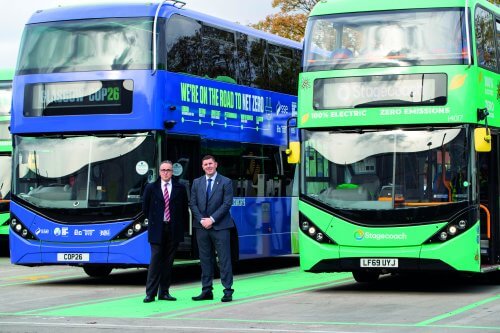COP26-branded bus visits Stagecoach, which has committed to target a zero-emissions UK bus fleet by 2035 with continued investment in new electric vehicles and 46 new buses to be introduced in Scotland
Stagecoach has welcomed the COP26 Road to Renewables battery-electric double decker bus to its depot Manchester, home to the region’s first electric double-decker bus fleet.
The COP26-branded vehicle visited the site on 25 October, on day six of its 11-day nationwide tour which has seen it travel from London to Glasgow, marking the COP26 climate change summit by showcasing examples of the national effort underway to decarbonise energy and transport.
In Manchester, the bus highlighted the need to work towards its net zero ambitions for the future, showcasing the multi-modal electric vehicle charging infrastructure. Vehicles from small to large were charged simultaneously during the visit, to illustrate how shared infrastructure will be crucial in the future of net zero transport. Buses can be fully charged at sites such as Sharston in just a few hours, and the depot also has a large solar array on the roof, generating renewable energy for the site to complement its grid connection.
Last year, Stagecoach introduced a brand new fleet of 32 electric double-decker buses in Greater Manchester, representing what it said was one of the biggest single investments in electric buses anywhere in Europe.
The operator has committed to the United Nations-backed Race to Zero initiative with a commitment to set science-based carbon reduction targets. It has also joined the Business Ambition for 1.5°C campaign, the world’s largest and fastest-growing group of companies that are helping to halve global emissions by 2030. The initiative is designed to provide a clearly defined pathway for companies to reduce their Greenhouse Gas (GHG) emissions in line with what is necessary to meet the goals of the 2015 Paris Agreement on climate change. Stagecoach has committed to the highest level of ambition in both the short and long-term by aligning its ambition with keeping global warming to 1.5°C and reaching science-based net-zero emissions by 2050.
As part of its recently launched Sustainability Strategy, the company is working on a roadmap to become a carbon neutral business by 2050 and will advocate for policy measures by Government to deliver a net-zero emissions economy. As well as firm targets around zero emissions, the new strategy includes initiatives to further reduce waste, conserve water and minimise energy use. Stagecoach said it has invested more than £1billion in greener vehicles over the past decade and has committed to target a fully zero-emission UK bus fleet by 2035. This year it will be introducing 46 new fully electric buses in Scotland as part of the Government’s Ultra Low Emission Bus Scheme.
Lee Wasnidge, Managing Director of Stagecoach Manchester said: “We’re thrilled that our Sharston depot, the home of the region’s first electric double-decker bus fleet, was a stop on the COP26 Road to Renewables tour. As part of the national effort already underway to decarbonise energy and transport, Stagecoach has already made significant steps to target a zero-emission bus fleet across the UK by 2035. However, achieving net zero is about much more than just switching technology. We need to change how we live, making less use of cars and switching to more sustainable public transport, cycling and walking. This along with what we have set out in our strategy is vital if we are to meet the objectives of COP26.”


